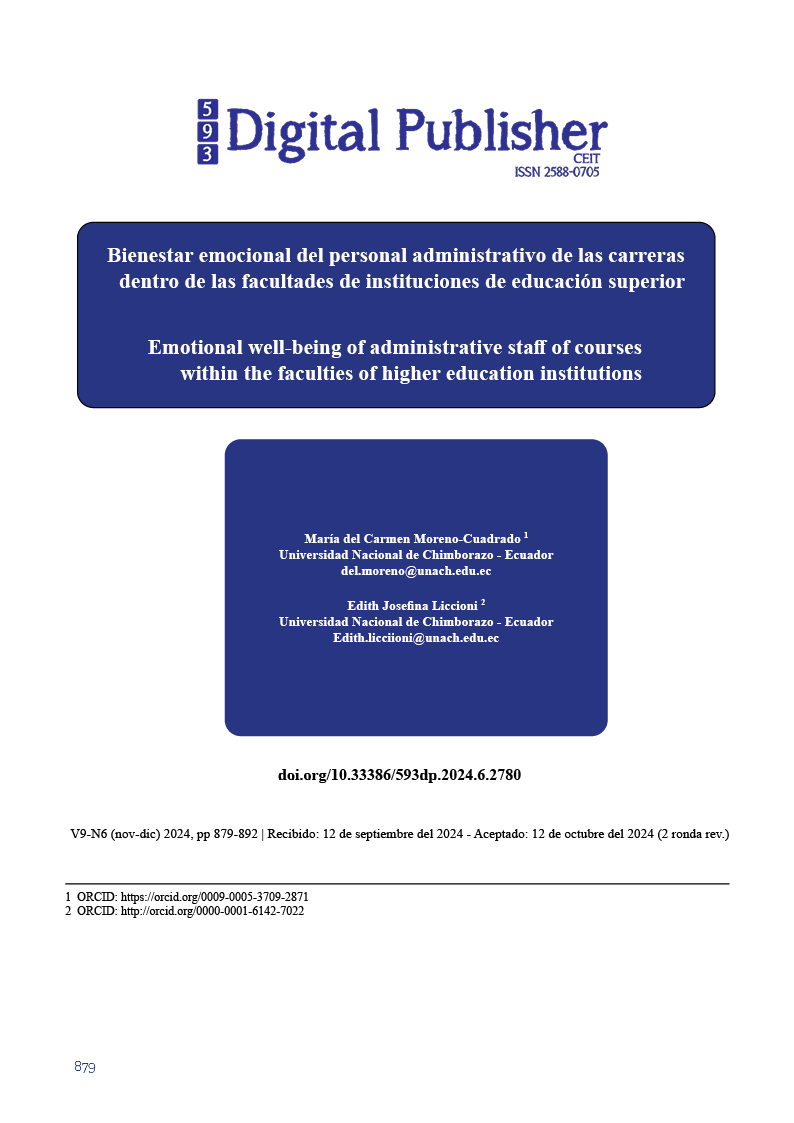Emotional well-being of administrative staff of faculties in higher education institutions
Main Article Content
Abstract
The emotional well-being of administrative staff in higher education institutions is crucial for their job performance and quality of life. A study conducted at the Escuela Superior Politécnica de Chimborazo (ESPOCH) examined the variables that affect this well-being, focusing on development opportunity, clear policies, and organizational support. The aim of the research was to identify and analyze these factors to better understand their influence on employees' mental health and job performance. Through Pearson correlation analysis, significant connections were found between various work variables and their impact on emotional well-being. A strong positive correlation was discovered between feedback and appreciation and recognition (r = 0.65, p < 0.01), suggesting that employees who receive positive feedback tend to feel more valued. In addition, a moderate correlation was observed between the perception of meaningful work and workload (r = 0.42, p < 0.05), indicating that a job perceived as meaningful is associated with a higher workload. Qualitative analysis revealed additional factors such as poor organization and workload management, poor communication, and lack of recognition, which negatively affect emotional well-being. Participants reported high levels of stress, tense behaviors, and limited ability to handle work demands. These findings underscore the need to implement effective strategies to manage stress and improve emotional well-being, creating a healthier and more productive work environment in higher education institutions.
Downloads
Article Details

This work is licensed under a Creative Commons Attribution-NonCommercial-ShareAlike 4.0 International License.
1. Derechos de autor
Las obras que se publican en 593 Digital Publisher CEIT están sujetas a los siguientes términos:
1.1. 593 Digital Publisher CEIT, conserva los derechos patrimoniales (copyright) de las obras publicadas, favorece y permite la reutilización de las mismas bajo la licencia Licencia Creative Commons 4.0 de Reconocimiento-NoComercial-CompartirIgual 4.0, por lo cual se pueden copiar, usar, difundir, transmitir y exponer públicamente, siempre que:
1.1.a. Se cite la autoría y fuente original de su publicación (revista, editorial, URL).
1.1.b. No se usen para fines comerciales u onerosos.
1.1.c. Se mencione la existencia y especificaciones de esta licencia de uso.
References
Agui-Ortiz, A. K. (2020). Bienestar y desempeño laboral de los trabajadores públicos de la UNHEVAL, Huánuco, 2019. Gaceta Científica, 6(4), 203–212. https://doi.org/10.46794/gacien.6.4.979
Alvarez, E. (2020). Educación socioemocional. ALAS, 11(20), 388–408. https://www.redalyc.org/journal/5886/588663787023/html/
Amasifuen Sajami, E., & Murayari Gonzales, C. A. (2022). Calidad De Vida Laboral Y Compromiso Organizacional En Una Institución Pública - Peruana 2022. Compendium: Cuadernos de Economía y Administración, 9(3), 241. https://doi.org/10.46677/compendium.v9i3.1064
Callís, S., Ramírez, K., & Ramírez, K. (2021). Sobrecarga en cuidadores de adultos mayores con demencia. Revista de Medicina Isla de La Juventud, 21(1), 1–20. https://remij.sld.cu/index.php/remij/article/view/277/475
Cordero-Guzmán, D., Beltrán-Tenorio, N., & Bermeo-Pazmiño, V. (2022). Cultura organizacional y salario emocional. Revista Venezolana de Gerencia, 27(Edición Especial 7), 118–131. https://doi.org/10.52080/rvgluz.27.7.10
Félix, R., García, C., & Mercado, S. (2018). EL ESTRÉS EN EL ENTORNO LABORAL. Campus IIT, 15(68), 31–42. http://erevistas.uacj.mx/ojs/index.php/culcyt
Fernández, E., & Ruíz, A. (2022). Nivel de satisfacción laboral del personal administrativo de Universidad San Gregorio de Portoviejo. Revista San Gregorio, 52, 20–36. https://revista.sangregorio.edu.ec/index.php/REVISTASANGREGORIO/article/view/2160
González, W. de J., & Vilchez, R. (2021). Factores del desempeño laboral del personal administrativo en universidades nacionales experimentales. Pensamiento & Gestión, 51, 54–74. https://doi.org/https://doi.org/10.14482/pege.50.658.155
Hernández-Gracia, T. J. (2023). Editorial: Desempeño laboral y bienestar social en las organizaciones. Revista Venezolana de Gerencia, 28(101), 8–9. https://doi.org/10.52080/rvgluz.28.101.1
Hernandez, S., Fernandez, C., & Baptista, P. (2014). Metodología de la investigación (Interamericana (ed.)). Mc Graw Hill.
Lira, C. M. (2022). Nivel de satisfacción y desempeño laboral del personal de enfermería. Más Vita, 4(4), 206–2016. https://doi.org/10.47606/acven/mv0179
López-Martínez, B. E., Aragón-Castillo, J. M., Muñoz-Palomeque, M., Madrid-Tovilla, S., & Tornell-Castillo, I. (2021). Quality of work-life and work performance in physicians at the Mexican Institute of Social Security, in the state of Chiapas. Revista de La Facultad de Medicina Humana, 21(2), 316–325. https://doi.org/10.25176/rfmh.v21i2.3706
López, V. E. R., Villavicencio, D. V. C., Anchundia, P. J. Q., & Arias, A. E. A. (2023). Estrés, ansiedad y desempeño laboral en docentes universitarios. South Florida Journal of Development, 4(8), 3047–3062. https://doi.org/10.46932/sfjdv4n8-009
Meherali, S., Punjani, N., Louie-Poon, S., Rahim, K. A., Das, J. K., Salam, R. A., & Lassi, Z. S. (2021). Mental health of children and adolescents amidst covid-19 and past pandemics: A rapid systematic review. International Journal of Environmental Research and Public Health, 18(7). https://doi.org/10.3390/ijerph18073432
Mejía Rubio, A. del R. (2023). Relación entre inteligencia emocional, funciones ejecutivas y rendimiento académico en escolares. LATAM Revista Latinoamericana de Ciencias Sociales y Humanidades, 4(3), 1153–1164. https://doi.org/10.56712/latam.v4i3.1139
Ramos-Narváez, A. D., Coral-Bolaños, J. A., Villota-López, K. L., Cabrera-Gómez, C., Herrera-Santacruz, J. P., & Ivera-Porras, D. (2020). Bienestar psicológico y satisfacción laboral. Archivos Venezolanos de Farmacología y Terapéutica, 39(2), 237–250. https://www.redalyc.org/articulo.oa? id=55969799016
Rojas Valero, E., & Blanco Jiménez, M. (2023). El salario emocional. Una revisión sistemática a la literatura. Innovaciones de Negocios, 20(39), 102–121. https://doi.org/10.29105/revin20.39-413
Sornoza Calva, B. O., García Conforme, A. B., Manrique Navarrete, G. N., & Peña Avila, G. A. (2023). La inteligencia emocional en la enfermería. Recimundo, 7(4), 179–186. https://doi.org/10.26820/recimundo/7.(4).oct.2023.179-186
Stover, J., Bruno, F., Uriel, F., & Fernández, M. (2017). Teoría de la Autodeterminación : una revisión teórica. Perspectivas En Psicología: Revista de Psicología y Ciencias Afines, 14(2), 105–115.
Viale, M., González, F., Cáceres, M., Pruvost, M., Miranda, A., & Rimoldi, M. (2016). Programas de intervención para el manejo del estrés de cuidadores de pacientes con demencia. Revista Neuropsicologia Latinoamericana SLAN, 8(No.1), 35–41. https://doi.org/10.5579/rnl.2016.0239



